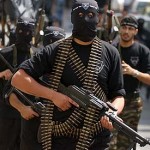Failed Talks Could Spur Third Intifada

That the current negotiations between Israel and the Palestinians, which come on the 10th anniversary of the Second Intifada are likely to fail, should come as no surprise. The greater danger however is that this inevitable breakdown could be used by Hamas as a pretext to launch the Third Intifada.
According to various reports, the Palestinian leadership will shortly be meeting, and are widely expected to publicly announce – with the support of the Arab League – that they will end the negotiations if renewed settlement construction by Israel in the West Bank is not halted immediately. Netanyahu’s government has already announced it has no intention of acquiescing to such demands.
Despite the Palestinians’ explanation that they only entered the negotiations following heavy pressure exerted by President Obama on Mahmoud Abbas, the fact of the matter is that there had been a settlement freeze for the past 10 months, having expired on 26 September, during which the Palestinians, despite ample opportunity, refused to negotiate.
Netanyahu repeatedly called for direct negotiations during that time, and prior, since becoming the Prime Minister in March 2009. Had Abbas agreed to enter negotiations well before the expiry of the 10 month freeze – which was dutifully observed by the Israelis - there would have been sufficient time to make headway in any negotiations. There may have even been the opportunity that the freeze could have been extended if the negotiations were producing results.
However, notwithstanding Obama’s pressure, Abbas purposely decided to enter the negotiations on the 11th hour knowing full well that Netanyahu would not extend the freeze and he would have an excuse to walk out on the talks - talks which he did not want to enter in the first place. This would then also allow Abbas and the Palestinian leadership to manipulate the media and public opinion by depicting Netanyahu as intransigent and the settlements as the main impediment to peace.
The fact of the matter is that the settlements are not the main impediment to peace and Netanyahu is anything but intransigent. Before 1967, there was not a single settlement in the West Bank (or Gaza), yet there were no calls for establishing a Palestinian state and at least 3 wars commenced by Arab states against Israel. In 2005, Israel left Gaza but was instead met by more rocket and terror attacks. And conveniently, many people often neglect the incredibly generous offers of peace made by previous Israeli Prime Ministers Ehud Barak and Ehud Olmert between 2000 and 2008.
The real impediment to peace is in fact Hamas, who continue to call for the destruction of Israel and have publicly announced that they will never recognize Israel or ever enter into negotiations with them. Their Charter, as everyone knows, but often overlooks, explicitly calls for the destruction of Israel.
Perhaps just timing, it is hard to ignore the fact that the current negotiations come on the 10th anniversary of the Second Intifada. Many Palestinians cite the former Prime Minister Ariel Sharon’s visit to the Temple Mount as the cause which led to the eruption of violence. However the Second Intifada also came following Arafat’s blank refusal of Ehud Barak’s offer of a Palestinian state on a silver plate during the Camp David negotiations in July 2000.
Only this Tuesday, Mahmoud Zahar, one of the Hamas leaders in Gaza confirmed what everyone already knew – that Arafat instructed Hamas to launch terror attacks against the Jewish state after negotiations with Israel failed – a failure caused completely by his decision to reject Barak’s offer and walk out of the negotiations without so much as even a counter-offer. Zahar added: “a growing number of Palestinians were now convinced that the armed struggle was the only way to deal with the Jewish state.” The phrase ‘armed struggle’ is of course a euphemism for terror.
Arafat was a master manipulator of Western media. Abbas, and the current Palestinian leadership, though not on the same level, now seem to be employing a similar strategy.
By entering the negotiations at the end of the 10 month moratorium – after nine and a half months of inaction – Abbas is betting that the negotiations will fail and the settlements will be depicted as the main impediment to peace. However, the negotiations will fail precisely because Abbas has set them up for failure from the outset by waiting to the end before agreeing to negotiate.
Abbas is also betting that the breakdown will result in greater pressure against the Israelis to make further concessions and even the possible defeat of the Netanyahu government. Ultimately, like Arafat he is making an investment – he is betting that by rejecting peace now – the Palestinians will get more concessions out of Israel later. If the last 10 years have proved anything – it is that this strategy is not only entirely flawed and misconceived – it has severely hurt the chances of there being peace and also delayed the creation of a Palestinian state.
The greatest danger in Abbas’ strategy however is the possibility that it will onset a chain of events culminating in a Third Intifada. Mahmoud Zahar has already stated that ‘an armed struggle was the only way to deal with the Jewish state.’ These are sentiments that have previously been echoed, including recently, by Ismail Haniyeh, Khaled Mashal and others from the Hamas leadership.
There is also a possibility that the breakdown in talks will lead to all kinds of internal Palestinian chaos if Abbas steps down and/or if a dissolution of the Palestinian Authority is declared – again, the doing of the PA itself. A frustrated Palestinian population may, as a result, deem Fatah irrelevant and turn to Hamas as their last hope.
The real danger therefore is that Abbas’ strategy will embolden Hamas, who may cue the breakdown as a carte blanche to launch an intifada.